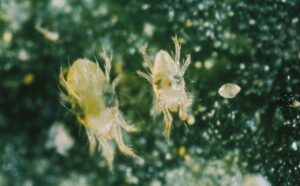
Some areas saw a bit or a lot of rain this past week but likely not enough yet to reduce our risk of spider mites in soybeans and dry beans. What is very concerning is that samples collected last year from 10 fields in southern Ontario all were resistant to dimethoate (Lagon or Cygon). The extent of this resistance is not yet known but through research with Western University, AAFC – London and OMAFRA, we hope to understand how widespread this resistance is in Ontario. It also increases our need to test these populations to find what alternative products are still effective and can be registered.
Oberon (spiromesifen) is a miticide that is registered for spider mites on dry beans in Canada, though it is priced for high value hort crops like strawberries. Being a miticide, it kills all stages of the mites, including eggs. If populations are caught in time to be able to do spot sprays along the fields edge or small pockets, it might enable applications to be more cost effective. The product is not currently registered for soybeans.
If you find any spider mite populations in soybeans or dry beans before an application is made (preferable), or after a dimethoate application has been made but was not successful at controlling the population, please contact Tracey Baute (contact info below). Samples will be taken back to the lab for testing and field information gathered to gain insights into these resistant populations. Fields with a history of spider mite problems or fields close to greenhouse operations are of special interest since they could influence what products they have been previously exposed to.
Funding for this project is provided by The Grain Farmers of Ontario (GFO), Ontario Greenhouse Vegetable Growers and MITACS, and the Ontario Research Fund.
For more information about this project or to notify us of field sites with spider mite populations to take samples for testing, contact: Tracey Baute, Field Crop Entomologist – OMAFRA at tracey.baute@ontario.ca or 519-360-7817